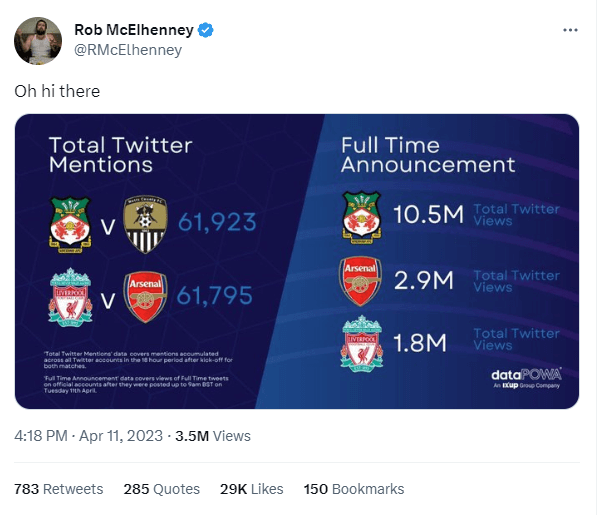At 4:59pm on Monday 10th April, events in a distant and modest part of North Wales reverberated globally across social media. In years and eras gone by, a clash between the top two teams in English football’s fifth tier would have warranted no more than an after-thought in the UK’s football discourse that day.
A number of other factors sparked heightened attention on Wrexham vs Notts County – in fact, take your pick. There were just five games to go at the end of a captivating National League season; both teams were running away from the chasing pack at the top of the table, pursuing record points totals in the process; the game itself ebbed and flowed, with the visitors leading at half-time, only for Wrexham to win an enthralling spectacle 3-2, with a last-gasp penalty save from 40-year-old ex-England goalkeeper Ben Foster.
But none of these usually extraordinary factors fully explained the unprecedented interest, demonstrated the following day on Twitter:
A graphic posted by Wrexham AFC co-owner and It’s Always Sunny actor Rob McElhenney on Twitter showed that by selected metrics on the platform, the match drew more attention and discussion than the Premier League’s headline game of the weekend, Liverpool vs title hopefuls Arsenal.
The data provided a fascinating insight into the impact that Hollywood stars McElhenney and his co-owner Ryan Reynolds have had in building a global profile for an unfashionable club with limited expectations to reach football’s upper echelons.
Yet it also poses many relevant questions to global media providers, social media platforms, elite football clubs, the sports media industry in its entirety, and the very nature of modern celebrity status.
What role does non-live sports content have in nurturing fandoms? How can an individual’s media platform be used to harness new followings? What can Premier League and other global clubs learn from this use of social media? We set out to understand all of these questions in our latest mailer.
Kind personalities
The Hollywood pair’s purchase of Wrexham in 2020 for around £2m may have been part of a swathe of multi-million pound foreign investments in British football teams in recent years, but that’s where the similarities with other cases swiftly end.
Foreign ownership of football clubs has hardly left the news cycle for one reason or another, either due to associations of human rights abuses, the stifling of funding to clubs, or absenteeism and consequent loss of connection with fanbases. But the duo are notable for having broken this all-too-familiar mould. Their Twitter feeds are awash with impassioned updates about the club, sincere posts demonstrating their care for the local community, and clips showing them living out an authentic fan experience. Above all, in a sport too often defined by distant or seemingly uncaring owners, they come across as kind personalities, a trait that reliably resonates with audiences but is all too often taken for granted from a content perspective.
Sports documentaries only tell half the story
This approach centred on genuine human emotion reflects a conscious media strategy, and one that continues to help the club’s status grow. Early on in their ownership there was some skepticism levelled at Reynolds and McElhenney’s motives upon hearing that the pair were in the process of making a documentary with Disney+ about their experiences. Welcome to Wrexham was released last year, and has been quietly successful among the slew of other non-live sports documentaries of recent years, albeit to less fanfare in the UK than similar titles like Prime Video’s All or Nothing series. However, Wrexham’s recent headlines do not owe themselves to the documentary’s release. In fact, critics suggested that the show’s charm lay less with its star power, and more with its community focus. McElhenney and Reynolds have revealed that, if anything, an individual’s own social media platform has become the most powerful platform to project their personalities.
Player influencers
The team’s addition of veteran goalkeeper-turned-YouTuber Ben Foster in March has only served to strengthen their social media presence. Foster’s video of the match, which featured himself and Reynolds sharing a moment of post-match celebration, had racked up almost 2 million views just a day after posting. By comparison, Manchester City’s official YouTube account’s highlights package of their thrashing of Bayern Munich in the Champions League had only achieved 1 million in the same period of time. This revelation speaks to the ongoing shift in the media landscape whereby audience appetite for content lies increasingly in individuals over brands, and with a more varied cultural twist than simply the match itself.
The Wrexham keeper’s media portfolio also includes The Fozcast, which frequently ranks as the #1 UK sports podcast on Spotify, and regularly features UK YouTuber guests. His affable style feels like a rare sight in football, an industry in which the players’ voices are often tightly policed by PR gurus and agents. The Welsh side’s acquisition of Foster has proven to be a savvy move, not just for his on-pitch heroics which could help to cap Wrexham’s fairytale story with promotion, but also help the club expand and diversify its online fandom, particularly among younger football fans.
Why does it matter?
The story of Wrexham may still just seem like a heartwarming tale of deserved success for an underdog city and club that’s been down on its luck, but for the sports media sector the data tells an equally powerful story. In a world where businesses count the clicks, and the fight for eyeballs is as hotly contested as on-pitch battles, football clubs and media organisations need to understand how to leverage new and existing sports fandoms. They’ve shown how to compete with sports wealth several orders higher than their own by the metrics of the new media age. Wrexham have forged a new path for others to follow – one led by earnest, feel-good personalities in a near-daily demonstration of their commitment to the game itself, to a local fanbase, and to a club that needs attention.
We are a group of passionate experts immersed in the intersection between sports and digital media. We have extensive experience conducting research and strategic thinking for leading media and sports organisations to help them transform for the digital age. We’ve conducted research into non-live sports content for a leading global media provider, cultural insights studies into the modern football fan, and research to understand how influencer content resonates with online audiences. If you’d like to discuss more about how we can help your organisation adapt to the shifting sports and media landscapes, please get in touch.

